Unearthing the secrets to successful gardening is always exciting, especially when growing unique and exotic plants like Eddoe or Taro root. These tuberous wonders add a touch of tropical beauty to your garden and offer a delicious culinary experience. Choosing the right fertilizer for Eddoe/Taro Root plants in pots is crucial to ensure they thrive and harvest bountiful.
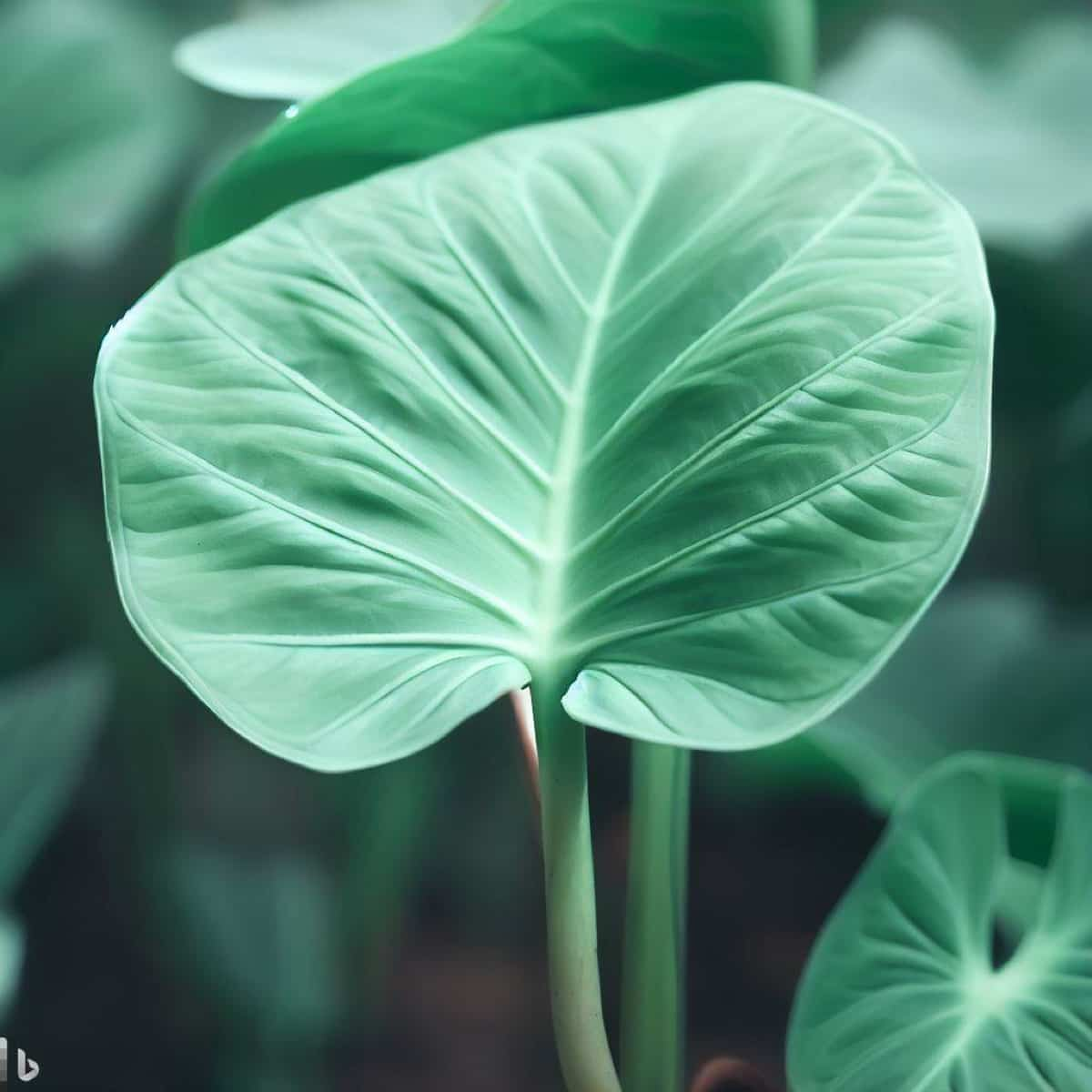
No matter which type of fertilizer you choose, you should always follow the packaging instructions regarding application rates and frequency. Over-fertilization can harm your plants’ health, so moderation is key. Remember to regularly monitor your Eddoe/Taro Root plants for any symptoms of nutrient deficiencies or excesses. Adjusting your fertilizer regimen accordingly will help maintain optimal plant health and productivity throughout their growing season.
Best Fertilizer for Eddoe/Taro Root Plants in Pots
Best Organic Fertilizers for Eddoe/Taro Root Plants in Pots
One of the best organic fertilizers for potted Eddoe/Taro root plants is compost. Compost is rich in nutrients and helps retain moisture in the potting mix. It can be made home using kitchen scraps, yard waste, and other organic materials. Another excellent option is well-rotted manure, which contains a blend of nitrogen, phosphorus, and potassium.
Another great choice for organic fertilizer is a bone meal or fish meal. These products are high in phosphorus, which promotes strong root development in Eddoe/Taro roots. Additionally, kelp meal or liquid seaweed extract can supply essential micronutrients to your potted plants.
Natural Fertilizers for Potted Eddoe/Taro Root Plants
Natural fertilizers are great for potted Eddoe/Taro root plants, providing essential nutrients without synthetic chemicals. These fertilizers are derived from plant matter, animal waste, and minerals. One commonly used natural fertilizer is compost. Compost provides nutrients and helps improve soil structure in pots. Another option is manure-based fertilizers. They can be sourced from animals like cows, horses, or chickens. Manure contains valuable nutrients such as nitrogen, phosphorus, and potassium, which are crucial for the growth of Eddoe/Taro root plants.
Slow-release Fertilizers for Container-grown Eddoe/Taro Root Plants
Slow-release fertilizers are a great option for container-grown Eddoe/Taro root plants. These fertilizers provide nutrients to the plants over an extended period, ensuring they receive all the nourishment they need for healthy growth. One popular slow-release fertilizer is compost. Compost contains many essential nutrients that Taro root plants require.
Another option is using controlled-release granular fertilizers specifically formulated for container gardening. These fertilizers come in small pellets or capsules that gradually break down to release nutrients as the plant needs them. They offer convenience and ensure that your Taro root plants receive a balanced supply of nutrients over an extended period.
In case you missed it: Best Fertilizers for Swiss Chard Plants in Pots: Organic, Slow-Release, Liquid, and Natural
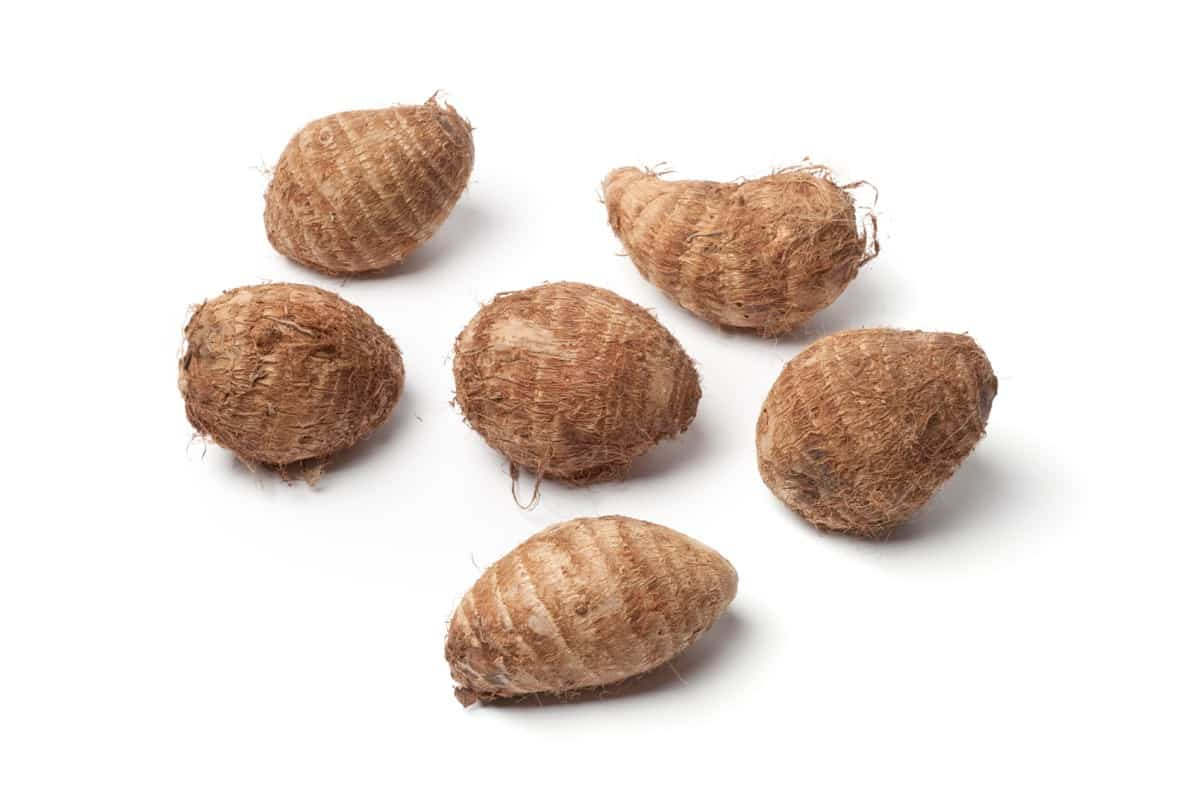
Alternatively, you can opt for slow-release organic fertilizer spikes or tablets for potted plants. These products slowly dissolve, nourishing your Eddoe/Taro roots throughout their growing season. Remember, following the manufacturer’s instructions regarding application rates and frequency when using slow-release fertilizers is important. This will ensure that your Taro root plants receive adequate nutrition without risking nutrient burn or other issues associated with over-fertilization.
High-nitrogen Fertilizers for Potted Taro Root Plants
Nitrogen is an essential nutrient supporting the development of lush foliage and vibrant green leaves. These types of fertilizers provide a much-needed boost to your Eddoe/Taro plant’s overall growth. When choosing high-nitrogen fertilizers for your potted Taro root plants, look for blood meal, feather meal, or fish emulsion options.
These organic sources are rich in nitrogen and can be easily absorbed by the roots. A blood meal is excellent for delivering nitrogen to your Taro plants. It releases nutrients gradually, ensuring consistent nourishment over time. A feather meal is another great option that slowly breaks down to release nitrogen into the soil.
Fish emulsion provides an immediate nitrogen source while enriching the soil with other beneficial nutrients like phosphorus and potassium. Remember that excessive use of high-nitrogen fertilizers can lead to imbalances in your plant’s nutrient uptake and potentially harm their health. Always follow package instructions and monitor your Taro plants regularly to ensure they receive the right nutrients for optimal growth.
Phosphorus-rich Fertilizers for Eddoe/Taro Root Plants in Pots
Phosphorus promotes strong root development, improves flowering and fruiting, and enhances plant health. Several options are available when choosing fertilizers rich in phosphorus for your potted Eddoe/Taro root plants. One option is rock phosphate, a natural phosphorus source that slowly releases nutrients. This slow-release characteristic ensures the plants receive a steady phosphorus supply throughout their growth cycle.
Another option is bone meal, made from ground animal bones and contains high phosphorous levels. You can also opt for organic fertilizers containing fish bone meal or bat guano. These natural phosphorus sources provide essential nutrients and improve the soil by adding valuable organic matter. It’s important to note that while phosphorus is vital for plant growth, excessive amounts can lead to nutrient imbalances or environmental pollution.
Potassium-based Fertilizers for Container-grown Taro Root Plants
When growing healthy and thriving Taro root plants in pots, potassium is a vital nutrient that should not be overlooked. Potassium helps to regulate water uptake, enhance disease resistance, and improve photosynthesis. Potassium-rich fertilizers are an excellent option for providing your potted Taro root plants with the necessary potassium. These fertilizers are specifically formulated to deliver a concentrated dose of this essential nutrient directly to your plants’ roots.
In case you missed it: Best Fertilizers for Eggplant Plants in Pots: Organic, Slow-release, Liquid, and Natural
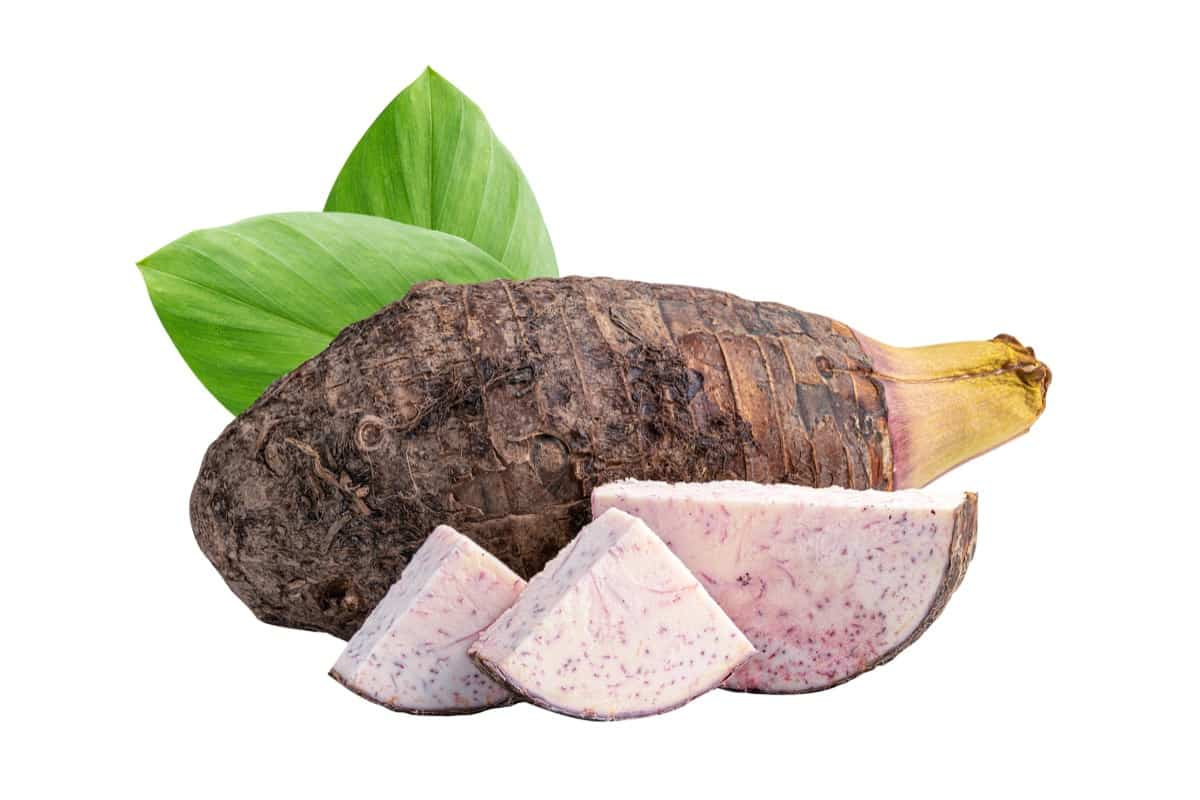
Potassium-based fertilizers come in various forms, including granular formulations that can be easily incorporated into the potting soil or liquid solutions that can be applied through watering. Whichever form you choose, follow the recommended application rates the manufacturer provides. Incorporating potassium-based fertilizers into your regular feeding routine ensures that your container-grown Taro root plants have an ample supply of this important nutrient. This will contribute to their health and vigor while promoting robust foliage growth and maximizing tuber production.
Micronutrient-rich Fertilizers for Potted Eddoe/Taro Root Plants
When it comes to selecting fertilizers rich in micronutrients, there are several options available. One popular choice is using compost or well-rotted manure as fertilizers. These organic materials provide valuable micronutrients and improve soil structure and fertility. Another option is using bone meal or fish meals, which are excellent sources of phosphorus and trace minerals.
You can opt for foliar sprays containing seaweed extracts or liquid kelp to boost micronutrients quickly. The leaves easily absorb these products and quickly deliver necessary nutrients to the plants. You can also consider using specialized micronutrient supplements that contain elements like iron, manganese, zinc, copper, etc., which may be lacking in your potting mix. Remember to carefully follow the instructions provided on these fertilizers and apply them at the recommended rates.
Best Fertilizer Ratios for Growing Taro Root Plants in Containers
Taro roots require a balanced nutrient profile to thrive, so choosing a fertilizer with the necessary elements is important. A good starting point is a fertilizer with an NPK ratio of 10-10-10 or 14-14-14. This balanced ratio ensures that your Taro plants receive equal amounts of nitrogen (N), phosphorus (P), and potassium (K). Nitrogen encourages leafy growth, while phosphorus promotes strong root development, and potassium aids in overall plant health.
To promote more foliage growth, consider using a higher nitrogen fertilizer, such as one with an NPK ratio of 20-10-10. This will help your Taro plants produce lush leaves and vibrant foliage. On the other hand, if you’re aiming for larger and healthier tubers, opt for a higher phosphorus fertilizer, like one with an NPK ratio of 5-15-15 or 0-20-20. Phosphorus stimulates root growth and enhances flowering and fruiting. To maintain proper balance in your container-grown Taro plants, avoid overlooking micronutrients. Look for fertilizers that contain trace elements like iron, manganese, zinc, copper, boron, molybdenum, and magnesium.
Water-soluble Fertilizers for Eddoe/Taro Root Plants in Pots
Water-soluble fertilizers are popular for nourishing Eddoe/Taro root plants in pots. These fertilizers come in a powdered or granular form that dissolves easily in water, making them convenient. When mixed with water, these fertilizers provide an immediate source of nutrients that the plant’s roots can easily absorb. One benefit of using water-soluble fertilizers is their ability to deliver a precise balance of nutrients. This is especially important for Eddoe/Taro root plants, requiring specific nitrogen, phosphorus, and potassium ratios for optimal growth.
In case you missed it: Greenhouse Growing for Urban Areas: Unlocking the Potential of Urban Spaces
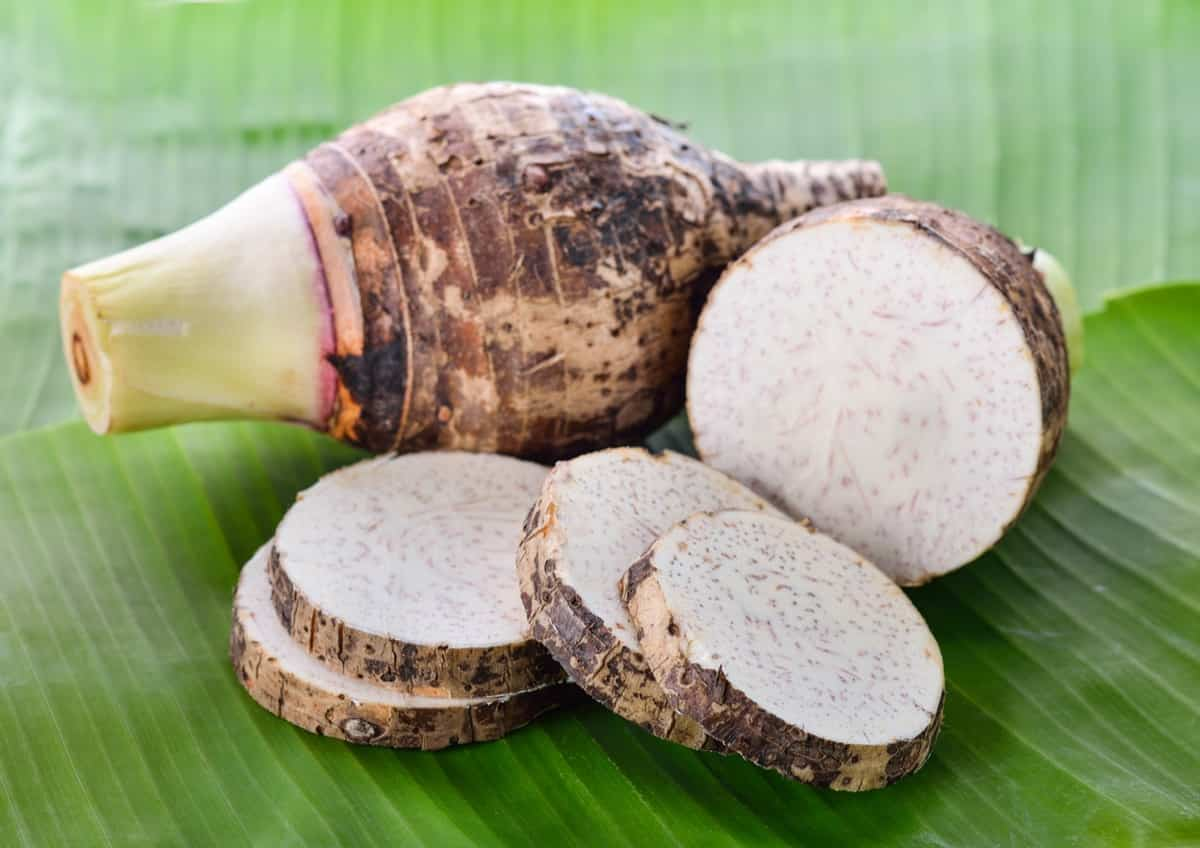
By following the recommended dosage instructions on the fertilizer packaging, you can ensure that your potted Eddoe/Taro root plants receive the right amount of nutrients without the risk of over- or under-fertilization. Another advantage of water-soluble fertilizers is their quick action. Since these fertilizers are dissolved in water before application, they can be readily taken up by the roots and transported throughout the plant’s system. This allows for faster nutrient absorption and utilization by the Eddoe/Taro root plants.
Organic Liquid Seaweed Fertilizers for Potted Taro Root Plants
If you’re looking for a natural and effective fertilizer option for potted Taro root plants, organic liquid seaweed fertilizers are worth considering. Derived from seaweed extracts, these fertilizers provide a wide range of essential nutrients that can promote healthy growth and development in your Eddoe/Taro root plants. Seaweeds naturally absorb minerals from the ocean, making them an excellent source of micronutrients such as calcium, magnesium, and iron. These elements are vital for strong root development and overall plant health.
When applying organic liquid seaweed fertilizer to your potted Taro root plants, following the manufacturer’s instructions regarding dosage and frequency is important. Generally speaking, though, diluting the fertilizer with water before application is recommended to ensure proper absorption by the roots. Incorporating organic liquid seaweed fertilizer into your potted Taro root plant care routine can promote robust growth while maintaining a natural approach.
Fertilizer Blends Specifically Formulated for Container-grown Eddoe/Taro Root Plants
Fertilizer blends specifically formulated for container-grown Eddoe/Taro root plants are a great option for ensuring optimal growth and health. These blends are carefully crafted to provide the right balance of nutrients that these plants need in a compact form. One key advantage of using fertilizer blends is their convenience. They come pre-mixed, saving the hassle of measuring and mixing different fertilizers. This makes them ideal for beginner gardeners or those who prefer a simple approach.
Another benefit is that these blends often contain a combination of slow-release granules and water-soluble nutrients. This ensures that your potted Eddoe/Taro root plants receive immediate nourishment and sustained feeding. It’s like giving your plants a balanced diet. Moreover, fertilizer blends consider the specific nutrient requirements of Eddoe/Taro root plants in pots. They typically include higher nitrogen levels to promote leafy growth, phosphorus to enhance root development, and potassium to support overall plant health.
Best Slow-release Granular Fertilizers for Taro Root Plants in Pots
When choosing the best slow-release granular fertilizers for your potted Taro root plants, a few options can help promote healthy growth and ensure optimal nutrient uptake. These slow-release formulas release nutrients gradually over time, giving your plants a steady supply of essential elements. One popular choice is a balanced NPK (nitrogen, phosphorus, and potassium) fertilizer specifically formulated for root crops like Eddoe/Taro root.
Look for a granular fertilizer with an NPK ratio around 10-10-10 or 14-14-14. This balanced formulation will give your Taro roots the necessary macronutrients for robust growth. Another option to consider is organic slow-release granular fertilizers. These products are made from natural sources such as composted plant material or animal manure.
In case you missed it: How to Grow Tabasco Peppers from Seeds: At Home, In Pots, Raised Beds, Terraces, and Backyard
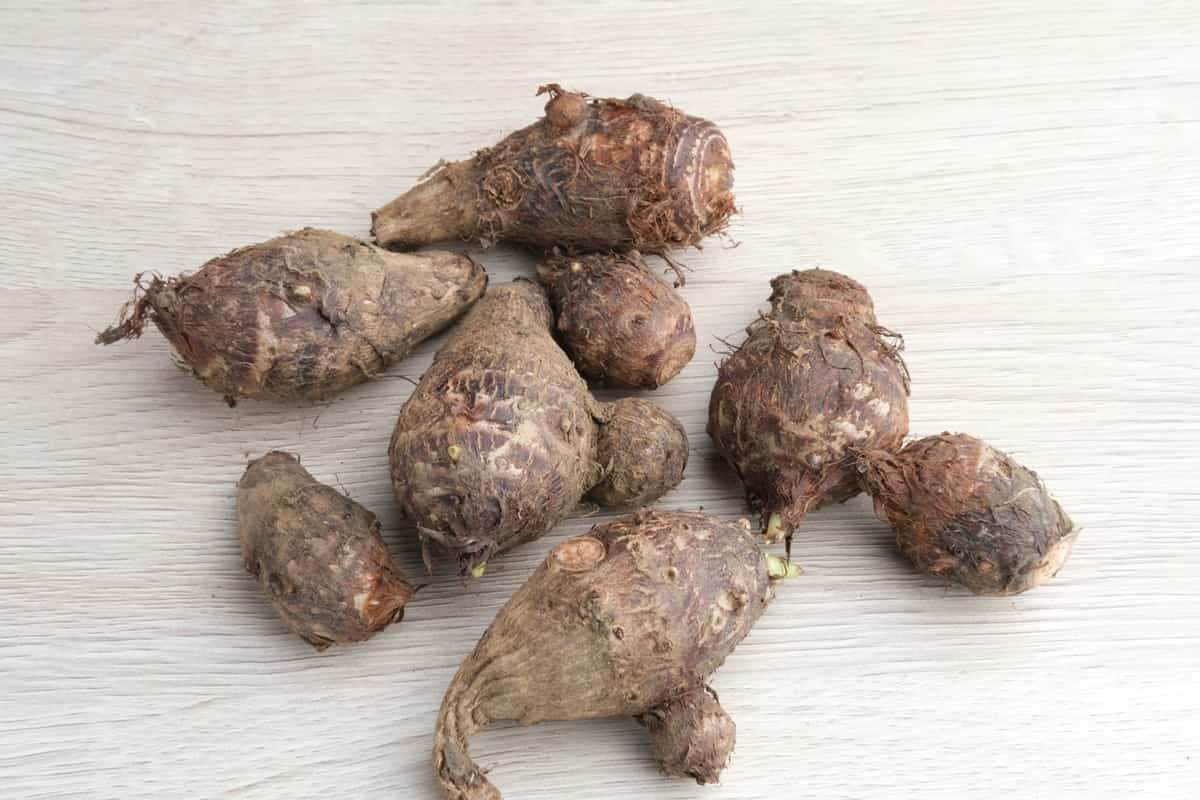
They provide essential nutrients, improve soil structure, and enhance microbial activity in the potting mix. Some gardeners prefer using slow-release coated fertilizers that have a controlled release mechanism. These specially designed granules release nutrients based on temperature and moisture levels in the soil, ensuring that your Taro roots receive constant nourishment throughout their growing season.
Fertilizer Recommendations for Healthy Growth of Eddoe/Taro Root Plants in Containers
When it comes to growing healthy Eddoe/Taro root plants in containers, choosing the right fertilizer is crucial. These plants require a balanced nutrient supply to thrive and produce abundant yields. Opt for organic fertilizers that provide a slow-release of nutrients. Organic options such as compost or well-rotted manure are excellent choices as they improve soil fertility and structure over time.
In addition to organic options, consider using natural fertilizers like fish emulsion or bone meal. These products contain essential nutrients that promote strong root development and overall plant health. To meet the specific nutritional needs of Taro root plants, choose fertilizers with high nitrogen content. Nitrogen is vital for leafy green growth, which is important for Taro roots’ energy production.
Phosphorus-rich fertilizers are also beneficial for these container-grown plants. Phosphorus aids in root development and strengthens their ability to absorb nutrients from the soil. Potassium-based fertilizers play a significant role in improving disease resistance and enhancing overall plant vigor. Look for potassium-rich options like kelp meal or wood ash to nourish your potted Taro roots effectively.
Taro plants require trace elements like iron, zinc, manganese, and copper for optimal growth. Choose fertilizers that contain these essential micronutrients to prevent deficiencies. Water-soluble fertilizers can be an excellent choice for convenience and ease of application. They provide quick nutrient uptake by the roots without leaving behind any residue in the potting mix.
In case you missed it: Blooming Haven: Easy Spring Flowers to Grow for Pollinators
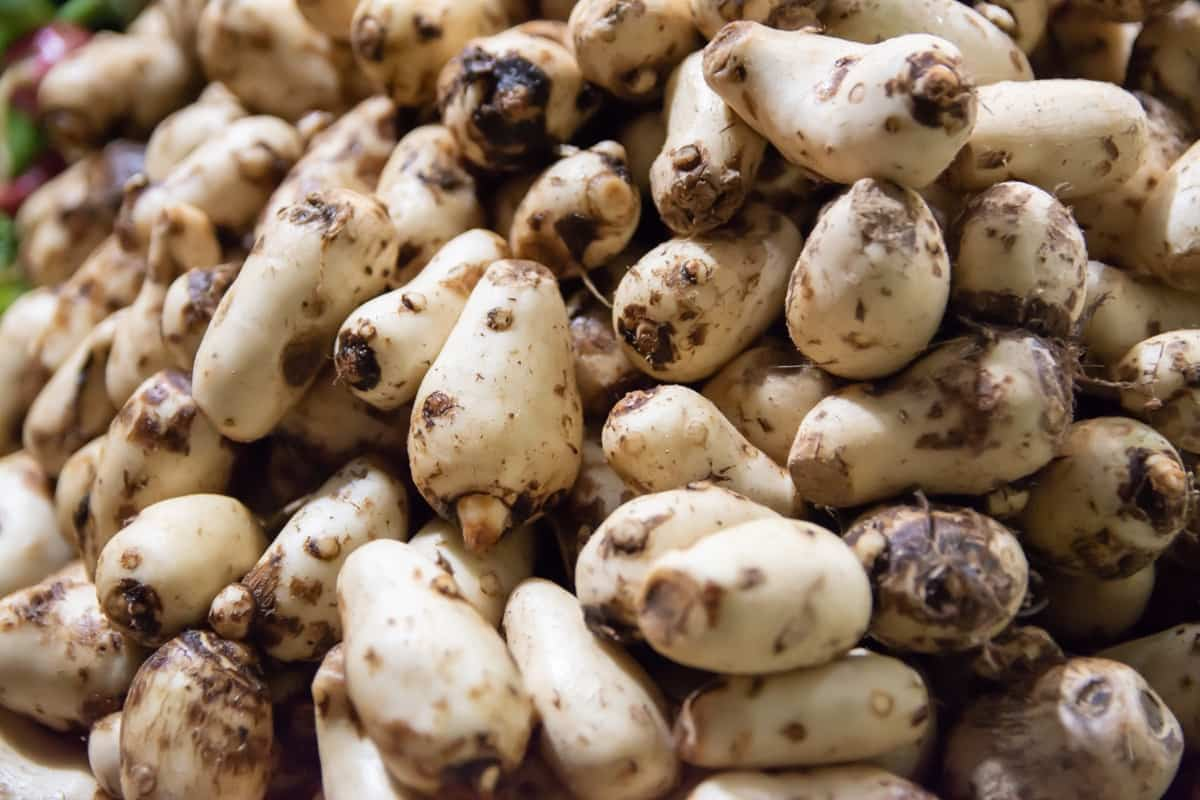
Conclusion
Eddoe/Taro root plants are a versatile and nutritious addition to any garden. Whether you grow them in pots or your backyard, providing the right fertilizers is essential for their healthy growth and abundant harvest. Growing Eddoe/Taro root plants in pots can be a rewarding experience. With the right fertilizers, you can ensure healthy growth and bountiful harvests. Whether you choose organic options, slow-release formulas, liquid seaweed fertilizers, or blends specifically formulated for container gardening, there are plenty of choices to meet your plant’s needs.
- How to Grow Hibiscus from Flower
- Plantation Ideas for Home Decoration: A Beginners Guide
- Flower Garden Designs and Layouts for Beginners
- Planting and Spacing Techniques in Papaya: A Beginner’s Guide
- Growing Gold: Essential Techniques for Planting Pineapples
- How to Make Kalanchoe Plant Bushy: Home Remedies and Solutions
- 11 Reasons Why Your Gardenia is Not Blooming: Home Remedies and Solutions
- Eco Elegance: The Guide to Designing a Drought-Tolerant Landscape
- Gardening on a Slope: Strategies for Hillside Landscaping
- Nourish and Flourish: Top Organic Mulches for Thriving House Plants
- Everything You Want to Know about Indian Mogra Flower: Discover Uses and Growing
- Green Thumb Success: Expert Tips for Cultivating Greenhouse Pumpkins All Year Round
- Maximize Growth & Flavor: The Ultimate Guide to Companion Planting in Herb Gardens
- How to Control Rhododendron Problems Naturally: Home Remedies and Organic Ways to Fix Them
- Natural Magic: The Remarkable Benefits of Cinnamon for Plants
- Best Steps to Revive Dying Tulip with Natural and Organic Treatment
- 10 Reasons Why Your Angel Trumpet is Not Blooming: Remedies and Treatment
- How to Fix Periwinkle Leaf and Flower-Related Problems: Natural Remedies and Solutions
- How to Fix Zinnias Leaf and Flower Problems: Discover Natural and Home Remedies
- Organic Steps to Induce Lemon Tree Flowers: A Comprehensive Guide
- Bloom Booster: Crafting the Perfect Homemade Bougainvillea Fertilizer
- Optimizing Growth: A Guide to Applying NPK Fertilizer for Potted Plants
- 10 Best Homemade Fertilizers for Rubber Plant: DIY Recipes and Application Method
- How to Boost Female Pumpkin Flowers: Effective Steps for More Flowers and High Yields
- Transform Your Indoor Garden: Top Benefits of Pink Salt for Houseplants
- 10 Best Homemade Fertilizers for Peacock Plants (Calathea): Easy DIY Guide
- Unlock Blooms: 9 Reasons Why Your Potted Chrysanthemum is Not Blooming
- 8 Reasons Why Your Potted Hibiscus is Not Blooming: Fix it with Simple Solutions
- Unlock Blooms: 9 Key Reasons Your Potted Frangipani Won’t Flower
- 10 Reasons Why Is My Ice Plant Not Blooming: Remedies and Treatment
- 10 Reasons Why My Potted Hydrangea Not Blooming: Treatment and Remedies
- 10 Reasons Why is My Wisteria Not Blooming: Remedies and Treatment
- 10 Reasons Why is My Goldfish Plant Not Blooming: Remedies and Treatment
- Maximize Your Space: Ultimate Guide to Balcony Gardening with Grow Bags
- 10 Reasons Why Your Iris is Not Blooming: Remedies and Treatment
- 10 Reasons Why Your Anthurium Plant is Not Blooming: Treatment and Remedies